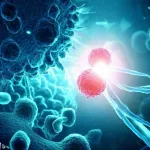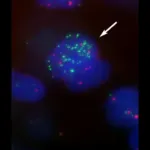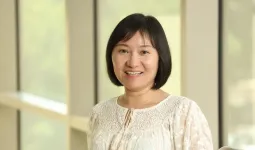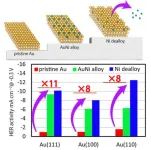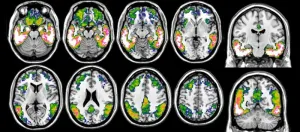(Press-News.org) FOR IMMEDIATE RELEASE
Deep-learning technology developed by a team of Johns Hopkins engineers and cancer researchers can accurately predict cancer-related protein fragments that may trigger an immune system response. If validated in clinical trials, the technology could help scientists overcome a major hurdle to developing personalized immunotherapies and vaccines.
In a study published July 20 in the journal Nature Machine Intelligence, investigators from Johns Hopkins Biomedical Engineering, the Johns Hopkins Institute for Computational Medicine, the Johns Hopkins Kimmel Cancer Center and the Bloomberg~Kimmel Institute for Cancer Immunotherapy show that their deep-learning method, called BigMHC, can identify protein fragments on cancer cells that elicit a tumor cell-killing immune response, an essential step in understanding response to immunotherapy and in developing personalized cancer therapies.
“Cancer immunotherapy is designed to activate a patient’s immune system to destroy cancer cells,” says Rachel Karchin, Ph.D., professor of biomedical engineering, oncology and computer science, and a core member of the Institute for Computational Medicine. “A critical step in the process is immune system recognition of cancer cells through T cell binding to cancer-specific protein fragments on the cell surface.”
The cancer protein fragments that elicit this tumor-killing immune response may originate from changes in the genetic makeup of cancer cells (or mutations), called mutation-associated neoantigens. Each patient’s tumor has a unique set of such neoantigens that determine tumor foreignness, in other words, how different the tumor makeup is compared to self. Scientists can identify which mutation-associated neoantigens a patient’s tumor has by analyzing the genome of the cancer. Determining those which are most likely to trigger a tumor-killing immune response could enable scientists to develop personalized cancer vaccines or customized immune therapies as well as inform patient selection for these therapies. However, current methods for identifying and validating immune response-triggering neoantigens are time-consuming and costly, as these typically rely on labor-intense, wet laboratory experiments.
Because neoantigen validation is so resource intensive, there are few data to train deep-learning models. To address this, the researchers trained BigMHC, a set of deep neural networks, in a two-stage process called transfer learning. First, BigMHC learned to identify antigens that are presented at the cell surface, an early stage of the adaptive immune response for which many data are available. Then, BigMHC was fine-tuned by learning a later stage, T-cell recognition, for which few data exist. In this manner, the researchers leveraged massive data to build a model of antigen presentation, and refined this model to predict immunogenic antigens.
The researchers tested BigMHC on a large independent data set, and showed that it was better at predicting antigen presentation than other methods. They further tested BigMHC on data from study co-author Kellie Smith, Ph.D., associate professor of oncology at the Bloomberg~Kimmel Institute for Cancer Immunotherapy, and found that BigMCH significantly outperformed seven other methods at identifying neoantigens that trigger T-cell response. “BigMHC has outstanding precision at predicting immunogenic neoantigens,” says Karchin.
“There is an urgent, unmet clinical need to tailor cancer immunotherapy to the subset of patients most likely to benefit, and BigMHC can shed light into cancer features that drive tumor foreignness, thus triggering an effective anti-tumor immune response,” says study co-author Valsamo “Elsa” Anagnostou, M.D., Ph.D., director of the thoracic oncology biorepository, leader of the Johns Hopkins Molecular Tumor Board and Precision Oncology Analytics, and associate professor of oncology in the Kimmel Cancer Center.
The team is now expanding its efforts in testing BigMHC in several immunotherapy clinical trials to determine if it can help scientists sift through hundreds of thousands of neoantigens to filter down to those most likely to provoke an immune response.
“The hope is that BigMHC could guide cancer immunologists as they develop immunotherapies that can be used for multiple patients, or develop personalized vaccines that would boost a patient’s immune response to kill their cancer cells,” says lead author Benjamin Alexander Albert, who was an undergraduate student researcher in the departments of biomedical engineering and computer science at The Johns Hopkins University when the study was conducted. Albert is now a Ph.D. student at the University of California, San Diego.
Karchin and her team believe BigMHC and machine-learning-based tools like it can help clinicians and cancer researchers efficiently and cost-effectively sift through vast amounts of data needed to develop more personalized approaches to cancer treatment. “Deep learning has an important role to play in clinical cancer research and practice,” Karchin says.
Study co-authors were Yunxiao Yang, Xiaoshan Shao and Dipika Singh of Johns Hopkins.
The work was supported in part by the National Institutes of Health (grant CA121113), the Department of Defense Congressionally Directed Medical Research Programs (grant CA190755) and the ECOG-ACRIN Thoracic Malignancies Integrated Translational Science Center (grant UG1CA233259).
Under a license agreement between Genentech and The Johns Hopkins University, Shao, Karchin and the university are entitled to royalty distributions related to the MHCnuggets neoantigen prediction technology. This arrangement has been reviewed and approved by The Johns Hopkins University in accordance with its conflict-of-interest policies. Anagnostou has received research funding to her institution from Bristol Myers Squibb, Astra Zeneca, Personal Genome Diagnostics and Delfi Diagnostics in the past five years. She is an advisory board member for Neogenomics and Astra Zeneca. She is an inventor on several patent applications submitted by The Johns Hopkins University related to cancer genomic analyses, ctDNA therapeutic response monitoring and immunogenomic features of response to immunotherapy that have been licensed to one or more entities. Under the terms of these license agreements, the university and inventors are entitled to fees and royalty distributions.
END
New machine-learning method may aid personalized cancer therapy
2023-08-09
ELSE PRESS RELEASES FROM THIS DATE:
Childhood cancer: "New" immune system responds better to therapy
2023-08-09
(Vienna, 9.8.2023) Scientists at St. Anna Children's Cancer Research Institute and the Eberhard Karls University of Tübingen have shown that immunotherapy after stem cell transplantation effectively combats certain nerve tumors in children. Crucially, stem cells from a parent provide children with a new immune system that responds much better to immunotherapies. These results of an early clinical trial were published in the prestigious Journal of Clinical Oncology.
Childhood tumors of the nervous system, known as neuroblastomas, are associated with an unfavorable prognosis ...
2024 HFSP Nakasone Award nominations are open
2023-08-09
The Human Frontier Science Program (HFSP) has published the new call for the 2024 HFSP Nakasone Award. Until September 30th, the global scientific community is invited to submit their nominations for this prestigious award.
The HFSP Nakasone Award recognizes groundbreaking contributions and breakthrough discoveries in the life sciences. The award celebrates exceptional achievements in scientific excellence, particularly those that have propelled the boundaries of biological knowledge forward.
In its 13th ...
CAREER Award: Fixing AI’s blind spot in image analysis
2023-08-09
For all the astonishing things artificial intelligence can do, it has a particular blind spot that one University of Virginia researcher seeks to remedy.
It can’t recognize all shapes.
“Current machine-learning models lack the capability to analyze and quantify the shape of objects presented in images with complex structures and large variations, especially in the context of medical imaging,” said Miaomiao Zhang, an assistant professor in the UVA School of Engineering and Applied Science.
The models are biased toward “seeing” image textures and have limited ability ...
The protein protectors of fertility
2023-08-09
Osaka, Japan – You’re likely familiar with RNA, the molecule that plays an important role in protein production and gene expression control. Perhaps you’re less familiar, however, with PIWI-interacting RNA (piRNA), a special type of RNA that protects the genome from mutations. Now, researchers in Japan have shed light on how these critical molecules are formed by the dynamics of several associated proteins in the germline of the fruit fly, Drosophila melanogaster.
In a new study published in the Journal of Cell Biology, researchers from Osaka University have clarified how the proteins Tejas (Tej), Vasa (Vas), and Spindle-E ...
AuNi alloy on Au electrodes for hydrogen evolution reaction: towards a cleaner tomorrow
2023-08-09
In recent years, hydrogen gas has gained momentum as the fuel for a clean and green future. This carbon-neutral fuel source releases huge amounts of energy via combustion in the presence of oxygen with water vapor as the by-product. One of the most popular methods of hydrogen production is the splitting of water into hydrogen and oxygen using electricity.
An electrochemical cell is used to split water, and the hydrogen gas gets released at the negatively charged electrode in hydrogen evolution reaction (HER). Catalysts are used to lower the ...
Sugars in breastmilk could help treat infections, prevent preterm births
2023-08-09
Breastfeeding has long been used as a method to help keep newborns healthy and protected against a variety of diseases. But certain sugars naturally found in breastmilk could also help prevent infections before a baby arrives. Researchers reporting in ACS Central Science have found that these sugars can stop a common prenatal infection in human tissues and pregnant mice. This could someday help avoid preterm births or complications without the need for additional antibiotics.
One of the most common bacteria that can affect pregnancies is Group B streptococcus (GBS). If left untreated, ...
Human scent receptors could help ‘sniff out’ nerve gases in new sensor
2023-08-09
By some estimates, the human nose can detect up to a trillion different smells with its hundreds of scent receptors. But even just catching a quick whiff of certain chemicals known as nerve agents can be lethal, even in tiny amounts. Researchers now reporting in ACS Sensors have developed a sensitive and selective nerve gas sensor using these human scent receptors. It reliably detected a substitute for deadly sarin gas in simulated tests.
Nerve gases are often very potent, requiring highly sensitive sensors to detect them ...
Microplastics found in human heart tissues, both before and after surgical procedures
2023-08-09
Everywhere scientists look for microplastics, they’ve found them — food, water, air and some parts of the human body. But examinations of our innermost organs that aren’t directly exposed to the environment are still limited. Now, in a pilot study of people who underwent heart surgery, researchers in ACS’ Environmental Science & Technology report that they have found microplastics in many heart tissues. They also report evidence suggesting that microplastics were unexpectedly introduced during the procedures.
Microplastics ...
Electric car revolution puts Native communities at risk
2023-08-09
Conditions are ripe for an accelerated transition to electric vehicle (EV) use in the United States. The Biden-Harris administration has set a target that 50 percent of newly purchased cars in 2030 be electric. In addition, the Inflation Reduction Act of 2022 provides significant tax incentives for purchasing electric vehicles and for companies that produce them.
And that is good news for environmental justice (EJ), says Lisa Benjamin, author of a paper called “EVs as EJ?” forthcoming in Harvard Environment Law Review. Benjamin, associate professor of law at Lewis & Clark Law School, details all of the positive impacts of EVs ...
Tau-PET : a window into the future of Alzheimer’s patients
2023-08-09
Alzheimer’s disease, one of the most common neurodegenerative diseases, leads to progressive loss of memory and autonomy. It is characterised by the accumulation of neurotoxic proteins in the brain, namely amyloid plaques and tau tangles. Due to the silent development of pathology over decades, very early diagnosis is of utmost importance to be able to take action as early as possible in the disease process. A team from the University of Geneva (UNIGE) and the Geneva University Hospitals (HUG) has demonstrated ...
